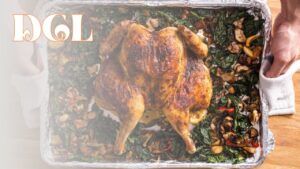Hey there! Have you ever wondered if it’s safe for dogs to eat cooked chicken skin? Well, I’m here to shed some light on the topic.
As a dog owner myself, I’ve always been curious about what foods are safe for my furry friend to enjoy. Chicken is a popular protein source for dogs, but what about the skin? While it may be tempting to share that crispy, flavorful skin with your pup, there are potential risks to consider.
However, there are also benefits to feeding dogs chicken in moderation. It’s all about finding the right balance and making informed decisions. In this article, we’ll explore the potential risks of feeding dogs cooked chicken skin, the benefits of chicken for our furry friends, and alternative treat options.
Remember, when it comes to your dog’s diet, consulting with a veterinarian is always a wise choice. Let’s dive in and find out if cooked chicken skin is a safe and healthy treat for our canine companions!
Understanding the Potential Risks
Did you know that feeding your dog cooked chicken skin can pose potential risks to their health? Many dog owners are unaware of the dangers that come with giving their furry friends this tasty treat. While it may be tempting to share your chicken dinner with your pup, it is important to understand the potential risks involved.
One of the main concerns with feeding dogs cooked chicken skin is its high fat content. Chicken skin is known to be fatty, and excessive fat consumption can lead to pancreatitis in dogs. This condition is characterized by inflammation of the pancreas and can cause severe abdominal pain, vomiting, and diarrhea. In some cases, pancreatitis can even be life-threatening.
Additionally, cooked chicken skin is often seasoned with various spices, such as salt and garlic. These seasonings can be harmful to dogs, as they can cause digestive upset, electrolyte imbalances, and even damage to red blood cells. It is always best to avoid feeding your dog seasoned food, as their digestive systems are not equipped to handle these ingredients.
In conclusion, while it may be tempting to share your cooked chicken skin with your furry companion, it is important to prioritize their health and well-being. The potential risks, such as pancreatitis and digestive upset, outweigh the temporary pleasure of giving them a tasty treat. It is always best to consult with your veterinarian before introducing any new foods into your dog’s diet to ensure their safety.

Benefits of Chicken for Dogs
Including chicken in your dog’s diet has several benefits:
- Chicken is a great source of protein, which helps build and repair muscles, tissues, and cells.
- It contains essential amino acids that contribute to their growth and development.
- Chicken is rich in vitamins and minerals like B vitamins, vitamin A, iron, and zinc, which support their immune system, skin, and coat health.
- It is a lean meat option, low in fat and calories, making it suitable for dogs watching their weight.
- Cooked chicken provides necessary nutrients for a healthy and active life.
However, it’s important to moderate chicken intake to avoid stomach upset or nutritional imbalances. Always consult your veterinarian for portion sizes and feeding guidelines.
Moderation and Portion Control
When it comes to feeding chicken to dogs, moderation and portion control are key. As a responsible dog owner, I always make sure to avoid overfeeding my furry friend.
It’s important to consider their individual dietary needs and adjust the amount of chicken accordingly. Additionally, I keep a close eye on any negative reactions they may have to ensure they are not experiencing any discomfort or allergies.
Avoid Overfeeding
Feeding your dog too much cooked chicken skin can lead to serious health issues, so it’s crucial to avoid overfeeding them. Dogs love the taste of chicken skin, but it is high in fat and can cause pancreatitis, obesity, and gastrointestinal problems if consumed in excess.
To prevent overfeeding, follow these three important guidelines:
- Portion Control: Limit the amount of cooked chicken skin you give to your dog. It should only make up a small portion of their overall diet.
- Balanced Diet: Ensure that your dog’s diet consists of a variety of nutritious foods, including lean proteins, fruits, and vegetables. This will help prevent them from becoming too reliant on chicken skin as their main source of nutrition.
- Treat Alternatives: Instead of relying solely on cooked chicken skin as a treat, consider offering your dog healthier alternatives, such as carrot sticks or small pieces of apple. These options are low in fat and provide valuable nutrients.
Remember, moderation and portion control are key when it comes to feeding your dog cooked chicken skin. By following these guidelines, you can keep your furry friend healthy and happy.
Consider Individual Dietary Needs
Consider your dog’s unique dietary needs and tailor their meals accordingly for optimal health and wellbeing. When it comes to feeding your dog cooked chicken skin, it’s important to consider their individual needs.
Some dogs may be able to tolerate small amounts of cooked chicken skin without any issues, while others may experience digestive problems or even pancreatitis. The high fat content in chicken skin can be difficult for some dogs to digest, leading to gastrointestinal upset.
In addition, the skin is often seasoned with spices or oils, which can be harmful to dogs. It’s best to consult with your veterinarian before feeding your dog cooked chicken skin to ensure it is safe for them.
Ultimately, prioritize your dog’s health and choose their food wisely.
Monitor for Any Negative Reactions
Be vigilant for any signs of adverse reactions as you carefully observe your furry companion after they have consumed the chicken skin. While some dogs may have no issues with eating cooked chicken skin, others may experience negative reactions. Here are some things to watch out for:
- Vomiting: If your dog starts throwing up after eating chicken skin, it may be a sign of an upset stomach.
- Diarrhea: Loose or watery stools can indicate that the chicken skin is not agreeing with your dog’s digestive system.
- Allergic reactions: Dogs can develop allergies to certain foods, including chicken. Look out for symptoms like itching, redness, or swelling.
- Pancreatitis: Fatty foods like chicken skin can trigger pancreatitis in some dogs. Symptoms include abdominal pain, vomiting, and loss of appetite.
- Obstruction: Chicken skin, especially if it is consumed in large quantities, can cause an obstruction in your dog’s digestive tract. Watch out for signs of discomfort or difficulty passing stool.
Remember, every dog is different, so it’s important to monitor your furry friend closely and consult with a veterinarian if you have any concerns.
Alternative Treat Options
When it comes to treating our furry friends, it’s important to provide them with safe and healthy alternatives to ensure their well-being.
One option is to make homemade dog treats using wholesome ingredients that are free from harmful additives or preservatives.
Alternatively, store-bought treats can also be a convenient option, but it’s crucial to carefully read the labels and choose ones that are made with high-quality ingredients and meet your dog’s dietary needs.
Safe and Healthy Alternatives
Try feeding your dog lean pieces of cooked chicken meat instead of the skin. This ensures a safe and healthy alternative. Chicken meat is a great source of protein for dogs and can be a tasty treat option.
When preparing the chicken, make sure to remove any bones, skin, and excess fat. Cut the meat into small, bite-sized pieces to prevent choking hazards. You can also try cooking the chicken without any added seasonings or spices, as some of these can be harmful to dogs. Another option is to boil the chicken to make it easier to digest.
Remember to always monitor your dog while they are eating and consult with your veterinarian if you have any concerns about their diet.
Homemade Dog Treat Recipes
For a fun and budget-friendly twist, whip up some homemade treats for your furry friend! Making your own dog treats allows you to control the ingredients and ensure your pup is getting a healthy and tasty snack. Here are five simple and delicious homemade dog treat recipes to try:
- Peanut Butter Banana Biscuits: Mix mashed bananas, peanut butter, whole wheat flour, and water. Roll out the dough, cut into shapes, and bake until golden brown.
- Sweet Potato Chews: Slice sweet potatoes into thin strips and bake until crispy. These make a great alternative to store-bought rawhide chews.
- Chicken and Rice Balls: Mix cooked chicken, cooked rice, and a beaten egg. Form into small balls and bake until cooked through.
- Pumpkin Pupcakes: Combine canned pumpkin, whole wheat flour, eggs, and honey. Spoon into cupcake liners and bake until firm.
- Apple Carrot Cookies: Grate apples and carrots, then mix with oats, cinnamon, and a little honey. Shape into cookies and bake until lightly browned.
Your pup will love these homemade treats, and you’ll love knowing exactly what they’re eating.
Store-Bought Treats
Store-bought treats offer a convenient and hassle-free option for treating your furry friend. They come in various flavors, shapes, and sizes, catering to different preferences and dietary needs.
These treats are specially formulated to provide dogs with the nutrients they need to maintain a healthy lifestyle. Plus, they undergo rigorous testing to ensure they are safe and free from harmful ingredients.
Some store-bought treats are even designed to promote dental health by reducing tartar and plaque buildup.
Additionally, these treats often have a longer shelf life compared to homemade treats, making them a practical choice for busy pet owners.
However, it is important to read the labels and choose treats made with high-quality ingredients. Remember to always give treats in moderation and adjust your dog’s diet accordingly to maintain a balanced nutrition plan.
Consulting with a Veterinarian
When it comes to the health and well-being of our furry friends, it’s important to consult with a veterinarian. They can provide professional advice based on their expertise and experience.
Additionally, veterinarians can offer individualized recommendations tailored to our dog’s specific needs and address any specific concerns we may have.

Professional Advice
Feeding cooked chicken skin to your dog may cause digestive issues and weight gain. It is important to consult with a veterinarian before making any dietary changes. A professional can provide personalized advice based on your dog’s needs and health condition. They can also help determine if your dog has any allergies or sensitivities to certain foods. Additionally, a veterinarian can guide you on portion sizes and frequency of feeding chicken skin, if it is deemed safe. Remember, what is safe for humans may not be safe for dogs. Seek professional advice to ensure your furry friend’s well-being and health.
Individualized Recommendations
Looking for personalized advice on your furry friend’s diet? A veterinarian can provide individualized recommendations based on your dog’s specific needs and health condition. They can assess your dog’s age, breed, weight, and any existing medical conditions to determine if cooked chicken skin is safe for them to consume.
Here are some reasons why seeking professional advice is important:
- A veterinarian can ensure that your dog is getting a balanced diet.
- They can help identify any potential allergies or sensitivities.
- They can advise on portion sizes and feeding schedules.
- They can provide guidance on supplements or dietary modifications.
- They can monitor your dog’s overall health and make necessary adjustments to their diet.
Remember, every dog is unique, and what works for one may not work for another. Consulting with a veterinarian will help ensure that you are making the best choices for your furry friend’s well-being.
Addressing Specific Concerns
If your beloved pet has any specific concerns or issues, a veterinarian can provide the necessary guidance and support to address them effectively. When it comes to feeding dogs cooked chicken skin, there are a few concerns that pet owners may have. One concern is the high fat content in chicken skin, which can lead to pancreatitis in dogs. Another concern is the seasoning or spices that may be present on the chicken skin, which can be harmful to dogs. It’s important to note that while some dogs may tolerate small amounts of cooked chicken skin, it is generally recommended to avoid feeding it to them due to these concerns. Always consult with your vet for personalized recommendations and guidelines.
| Pros | Cons |
|---|---|
| Rich in flavor | High fat content |
| Crispy texture | Seasoning and spices |
| Appealing to dogs | Potential pancreatitis risk |
Frequently Asked Questions
Can dogs eat raw chicken skin?
No, dogs should not eat raw chicken skin. Raw chicken can contain harmful bacteria like salmonella, which can make dogs sick. It is safer to feed them cooked chicken skin in moderation.
Is it safe to give dogs leftover chicken skin from a cooked meal?
Yes, it is safe to give dogs leftover cooked chicken skin. However, moderation is key as too much can lead to pancreatitis. Remove any seasoning or bones, and ensure it is a small part of their overall diet.
Are there any specific health risks associated with dogs consuming chicken skin?
There are some health risks associated with dogs consuming chicken skin. It can be high in fat, which can lead to pancreatitis or obesity. It may also contain seasonings or cooking oils that can be harmful to dogs.
Can chicken skin cause digestive issues or upset stomach in dogs?
Chicken skin can cause digestive issues and upset stomach in dogs due to its high fat content. It is best to avoid feeding them cooked chicken skin to prevent any potential health problems.
How often can dogs be given chicken skin as a treat?
Dogs should only be given chicken skin as an occasional treat due to its high fat content. Feeding it too often can lead to digestive issues and weight gain, so moderation is key.
Conclusion
In conclusion, while dogs can eat cooked chicken skin, it is important to understand the potential risks associated with it. These risks include pancreatitis and obesity.
It is crucial to practice moderation and portion control when feeding chicken skin to your dog. This means not giving them too much and being mindful of their overall diet.
Consider alternative treat options that are safer and healthier for your dog. There are many dog-friendly treats available that are specifically made for their dietary needs.
Consulting with a veterinarian can provide valuable guidance and ensure the well-being of your furry friend. They can help you determine the best diet and treat options for your dog’s specific needs.
Remember, a balanced and nutritious diet is key to keeping your dog healthy and happy. It is important to provide them with the proper nutrients they need to thrive.


